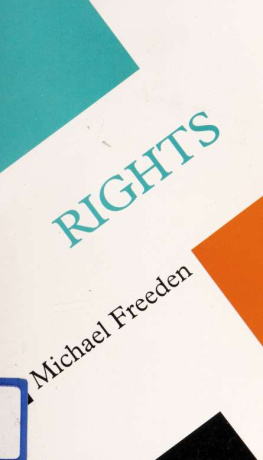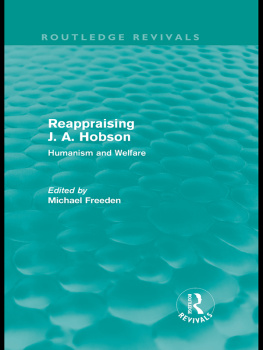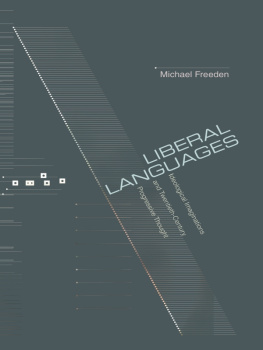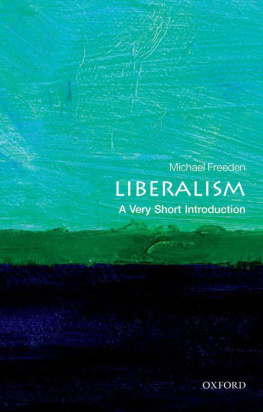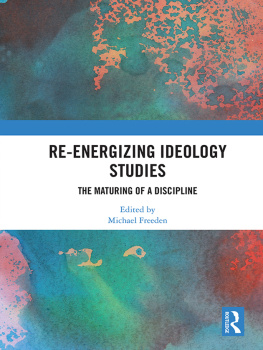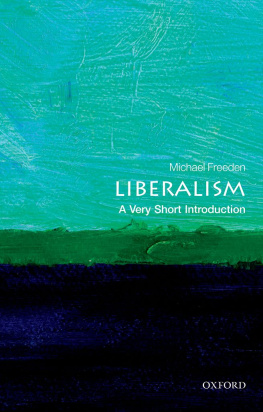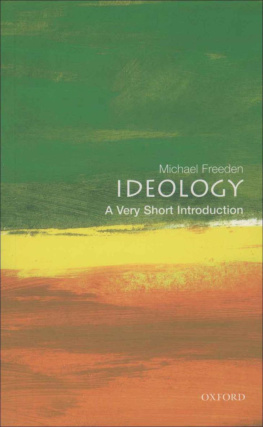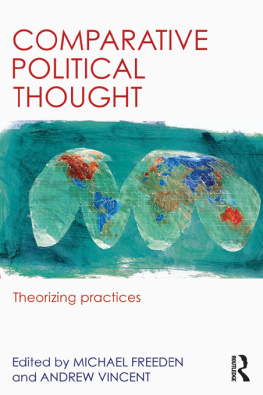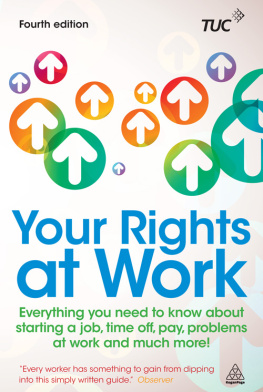Freeden - Rights
Here you can read online Freeden - Rights full text of the book (entire story) in english for free. Download pdf and epub, get meaning, cover and reviews about this ebook. City: Minneapolis, year: 1991, publisher: University of Minnesota Press, genre: Politics. Description of the work, (preface) as well as reviews are available. Best literature library LitArk.com created for fans of good reading and offers a wide selection of genres:
Romance novel
Science fiction
Adventure
Detective
Science
History
Home and family
Prose
Art
Politics
Computer
Non-fiction
Religion
Business
Children
Humor
Choose a favorite category and find really read worthwhile books. Enjoy immersion in the world of imagination, feel the emotions of the characters or learn something new for yourself, make an fascinating discovery.
Rights: summary, description and annotation
We offer to read an annotation, description, summary or preface (depends on what the author of the book "Rights" wrote himself). If you haven't found the necessary information about the book — write in the comments, we will try to find it.
Freeden: author's other books
Who wrote Rights? Find out the surname, the name of the author of the book and a list of all author's works by series.
Rights — read online for free the complete book (whole text) full work
Below is the text of the book, divided by pages. System saving the place of the last page read, allows you to conveniently read the book "Rights" online for free, without having to search again every time where you left off. Put a bookmark, and you can go to the page where you finished reading at any time.
Font size:
Interval:
Bookmark:

This book made available by the Internet Archive.





For Daniella and Jonathan
Digitized by the Internet Archive in 2017 with funding from Kahle/Austin Foundation
https://archive.org/details/rightsOOfree









Preface
Three themes run through this book. First, it examines briefly some of the major concerns of contemporary rights-theory. Second, in so doing it concentrates on the universe of theories and statements about rights in order to learn more generally about the modes and patterns of human thought-behaviour concerning politics. The concept of rights is particularly useful in this context because it straddles the notion of the individual and the notion of the political association, engaging with questions relating both to the private and to the public, and informing us about human aspirations and peoples attitudes towards themselves both as political actors and as members of communities. Rights have manifest meanings known to their users as well as latent meanings which the student of rights has to uncover. The main emphasis of this book is on the ideological decoding of the role the concept of rights plays in political language rather than on the truth status of arguments about rights. Its aim is not to construct a theory of rights but to use the first order thinking-acts of people who do so as the subject matter for second order analysis. That analysis is a central function of political theory. On the basis of that understanding (third) the case will be put for some underestimated interpretations of rights. These will not necessarily identify correct meanings but will rather regard them as plausible underpinnings to the developments in political thought and practice that typically accompany the emergence of civilized standards within modern welfare states. The emphasis throughout is on how rights are , have been and can be, not on how they ought to be, employed. Readers must feel free to use the following analysis as a basis for their own preferences.
X
Rights
I am grateful to Bill Jordan and Joseph Raz for their helpful observations on the typescript. Brian Barry and Robert Goodin assisted by commenting on earlier work of mine on rights, out of which this project developed. Irene, Daniella and Jonathan generously waived some of their rights, and took on supererogatory duties, in order to enable me to complete this book.
Michael Freeden Mansfield College, Oxford
The Concept of Rights
Approaches and methods
The concept of rights has become one of the most reputable and positively connoted in political theory. The desirability of promoting in principle the ideas represented by the concept is far less controversial than, for example, the promotion of equality, democracy or even liberty . 1 Only a minority of viewpoints, such as the Marxist critique and some extreme versions of consequentialism, point to the possibility that adherence to rights might cause social or human damage. Modern political theory, which may be said to have begun with Hobbes, locates the notion of rights at the centre of its debates. The liberal state and constitutional theory have emphasized rights as fundamental building blocks of the social order, sometimes even as its raison d'etre. The latter half of this century has witnessed a proliferation of concern about human rights in general as well as interest in the particular rights of categories of human beings (such as women, children, homosexuals, the elderly, the handicapped, the unborn and even future generations). Specific institutions have been established to promote human rights. Two hundred years after its revolution France erupted in a blaze of celebratory publications and events to commemorate what is now portrayed as the revolutions most enduring and fundamental legacy: la declaration des droits de l'homme et du citoyen? All this presents a challenge to the analyst of rights: why is a right such an attractive term, what role does the concept play in political debate and in social organization, what does it signify to its diverse users, how does it obtain its range of meanings, and how, if at all, can that range be assessed?
Rights
In contradistinction to the method adopted by some philosophers I shall not attempt to construct an ideal system, or a conclusive list, of rights, nor will I endeavour to answer the question of whether human beings are intrinsically rights-bearing entities. I will also abstain from confronting the issue of whether rights exist independently of our knowing about them (if they did they would need to be discovered rather than invented). This reticence does not reflect any intellectual hesitation to take on these central issues but pertains to the particular nature of this inquiry. At its heart is a concern not with the retrieval of the logical and semantic relationships between, and the implications of, statements about rights, nor with their grammatical structure, nor with stipulated resolutions of ethico-philosophical issues , 3 nor even with exploring or delineating their unceasing intricacies , 4 but with analysing the general paradigms human beings employ when they think (as professionals or amateurs) about political issues. This is a book about human behaviour: the thought-behaviour of people when they reflect on rights. Its purpose is to elucidate the patterns of such thinking, to explore the combinations of ideas utilized in different theories and to understand why different implicit and explicit assumptions about rights lead to different political arrangements and solutions. It will do so, among other means, by uncovering the assumptions that have to hold in order for a particular theory to be deemed true or false. It will, of course, consider some of the main philosophical and legal approaches but only as part of the subject matter of this study, not in order to associate itself directly with those genres of scholarship. This book has no pretensions to be inclusive; its aim is rather to identify central issues and problems.
How do we go about understanding what a right is? The meaning of a concept is shaped by the range of further concepts that are attached to it and support it. Concepts as units of political theory do not occur in a vacuum. All too often analyses of rights pay little regard to the concrete and variegated ways in which the concept is underpinned by a host of related terms that act crucially to establish its different meanings . 3 The concept of a right is linked to concepts such as liberty, equality or individuality. Any actual usage of the word right will be connected to specific meanings, plucked from a spectrum of possible meanings, of each of its adjacent concepts. The resulting configurations will enable the content and role of right to be interpreted. The range of related concepts is very wide
Font size:
Interval:
Bookmark:
Similar books «Rights»
Look at similar books to Rights. We have selected literature similar in name and meaning in the hope of providing readers with more options to find new, interesting, not yet read works.
Discussion, reviews of the book Rights and just readers' own opinions. Leave your comments, write what you think about the work, its meaning or the main characters. Specify what exactly you liked and what you didn't like, and why you think so.

